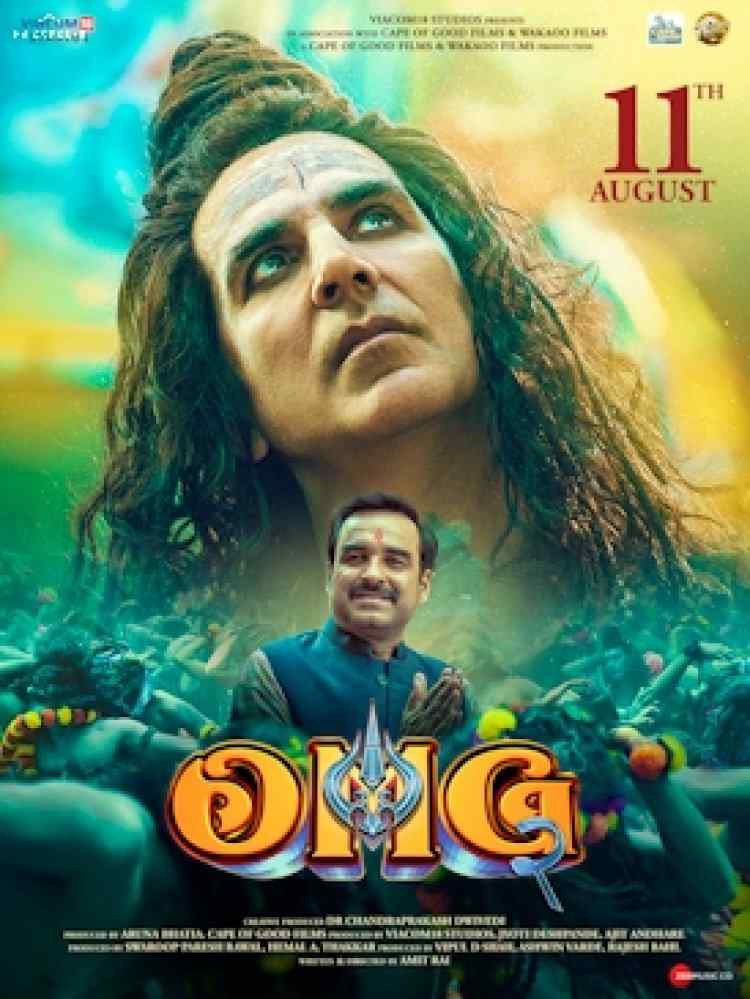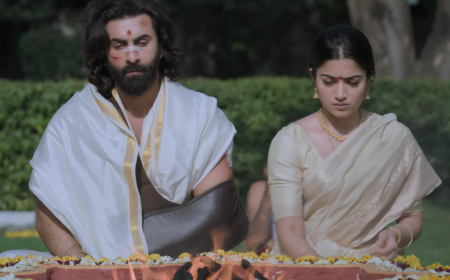Film Review: OMG 2
"OMG 2 is undoubtedly thought-provoking, challenging the audience to reflect on an issue that is swept under the carpet", writes Dipankar Sarkar

Dipankar Sarkar, a renowned Indian cinema critic and a graduate of the Film and Television Institute of India (FTII), Pune, provides an analysis of the Hindi film titled "OMG 2." According to Sarkar, the film is unquestionably intellectually stimulating, since it challenges the spectator to engage in introspection over a matter that is often ignored or disregarded.
To begin with, OMG 2, a spiritual sequel to OMG (2012), is a film that advocates the need for sex education for young people in schools and homes across India. It is very commendable for writer-director Amit Rai to tackle such a taboo subject and push for open dialogue about sexual education in a conservative society. Though structured around an interesting premise, the lack of nuanced exploration of the subject hinders initiating a discourse that impacts viewers' engagement.
The film is set in a religious town in north India, where people from across the world come to visit the Mahakal temple. The protagonist of the film Kanti Saran Mudgal, Pankaj Tripathi, is a staunch follower of Lord Shiva and survives by selling puja paraphernalia to devotees. He lives happily with his wife, Indumati (Geeta Agrawal), daughter, Damayanti, and son, Vivek (Aarush Varma), who studies at a posh school. One day Vivek is admitted to the hospital, and the doctor (Brijendra Kala) informs him that his son lost consciousness after excessive masterbation after consuming sexually stimulating tablets. The incident remains a secret between the angry father and shameful son. But Kanti’s world turns upside down when he learns that a video of Vivek masterbating in the school toilet has gone viral. As a result, Vivek is expelled from the school, and his family has to face shame in society. Kanti prays to Lord Shiva to help him out of the trouble. As a result, an avatar (Akshay Kumar) as a messenger of God is sent to rescue Kanti from his woes. The messenger motivates Kanti to file a case in court and fight against the injustice done to his son by dragging all the individuals to court. But when a smart and strong lawyer, Kamini Maheshwari (Yami Gautam), enters the scene as a defendant, no one is interested in being his prosecutor. Kanti now has to educate himself and fight the case on his own.
Sex education has always been taboo in our society, and an open and honest conversation is necessary in order to address misconceptions and promote a healthier understanding of sexuality. But the solutions provided by Kanti during his argument with Kamini in court are too easy and idealistic. It is important to consider that cultural and societal barriers in our society will also hinder the implementation of comprehensive sex education. Rather than just verbal conflicts, a more nuanced approach to taking these complexities into account was needed to effectively address the issue of sex education in our society. Kanti flipping the pages of multiple books and browsing the internet for reliable information day and night is not cinematic enough to capture the urgency and importance of this topic. On the contrary, the defending lawyer, Kamini, makes more sense than he does, especially when she logically tries to explain the potential consequences of adopting a liberal approach to sex education. But Kanti uses references from ancient Indian texts like the Kamasutra, Panchatantra, and erotic architecture of Khajuraho to bring logic to his arguments against his opponent. He also makes reference to the progressive attitude of Sanatan Hinduism in the past and how individuals exhibited broad mindedness towards sexuality. By doing so, the film serves as a testament to Hinduism's progressive roots by showcasing its inclusive and forward-thinking nature.
Moreover, each of the sessions at court ends with a task given to Kanti by Judge Purushottam Nagar (Pavan Malhotra). After a brief moment of struggle, the messenger of God would chance upon Kanti and provide him with a solution by talking in riddles. Such instant resolution makes us realize that Kanti needed a professional advisor and not a Godly figure to bring an end to his misery. After a point, this strategy of initiating a conflict and providing a resolution becomes so repetitive that it hinders its ability to engage the audience and propel the narrative forward. In comparison, the prequel's exploration of faith and skepticism adds depth to the story as it challenges the audience to examine their own beliefs and biases. So, the inclusion of an incarnation of God perfectly fits the narrative. Whereas, here it looks like just a forced plot device and lacks organic development.
Vivek, who is central to the plot, is sidetracked as the court session begins. Now, the focus remains solely on the father rather than a joint endeavor between the father and the son. The culprit students from the school who not only shot the video but also circulated it were never discussed during the trial. This omission raises questions about the fairness and thoroughness of the proceedings. The sudden inclusion of the conversation about sexual abuse between Pujari (Govind Namdev) and her granddaughter feels out of place and feels forcefully included in the narrative. Kanti being driven by the messenger of God at breakneck speed in a Ferrari for the final hearing is an exaggeration. However, it is truly disheartening to see Kamini's character, who was initially portrayed as strong-willed, reduced to a weak and submissive being at the end of the film.
Amalendu Choudary's cinematography lacks in visually capturing the essence of the theme and falls short in delivering a compelling visual narrative. The shots and framing fail to evoke the desired emotions, leaving the overall visual presentation weak and underwhelming. Despite the seamless visual flow achieved through Suvir Nath's editing, the film ultimately falls short as it continuously revolves around its central theme for a good length of time without offering any progression in the narrative. Mangesh Dhakde’s background score as well as the songs work in bits and pieces.
Performance wise, Pankaj Tripathi as Kanti keeps the audience hooked with his impeccable acting skills. His ability to effortlessly strike a balance between humor and drama showcases his versatility as an actor, making him a standout in the film. Akshay Kumar, as the incarnation of Lord Shiva, brings a comic charm to his character. The female characters in the film are well-crafted and bring depth to their roles, making it a refreshing and empowering viewing experience. Yami Gautam, in the role of Kamini, uses her sharp wit and cunning tactics to make her a force to be reckoned with in the courtroom. Her relentless determination and ability to exploit any situation to her advantage make her a formidable opponent for any opposing counsel. Geeta Agrawal, as Kanti’s wife, Indumati, is a meek and emotional person who often finds herself caught in the middle of conflicts. Her scene in the courtroom provides a perfect blend of comedy and heartfelt emotions, leaving the audience both laughing and moved. Aarush Varma, as Vivek, performs his role with such innocence that he earns our sympathy. Pawan Malhotra, as Purushottam Nagar, brings a comic shade as well as seriousness to his character with equal charm.
OMG 2 is undoubtedly thought-provoking, challenging the audience to reflect on an issue that is swept under the carpet. But the way it is put into practice lacks sophistication. It uses verbosity and even simplistic solutions to make its point. Despite this flaw, the film manages to spark important conversations about its central theme.
***
What's Your Reaction?

































































